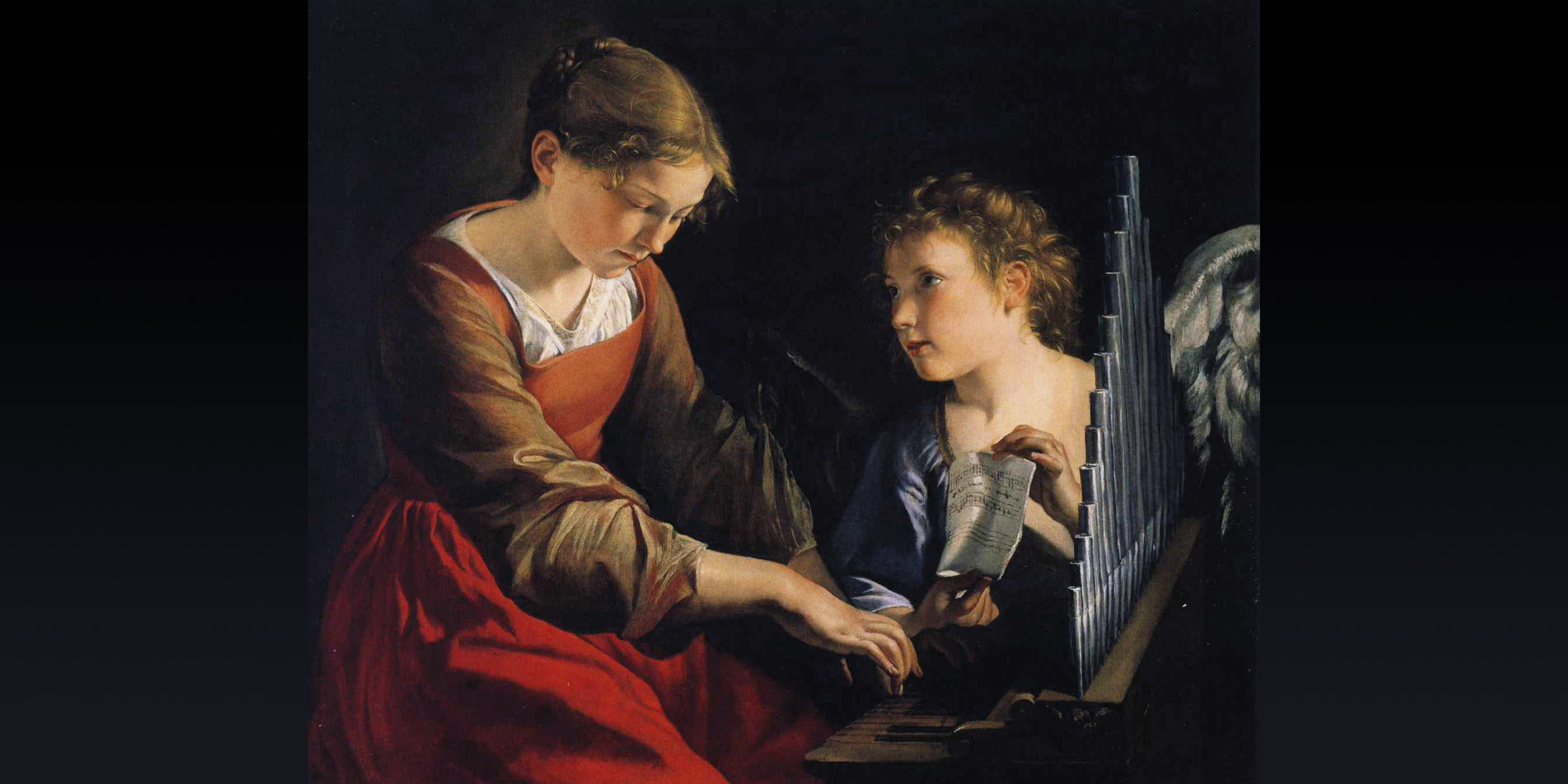Originally published 19 November 1990
Late night, candlelight, bottle of wine. Outside, the stars of Orion high in the sky. Mars blazes brightly between the horns of Taurus. The Pleiades twinkle. On the stereo, a favorite piece of music, Henry Purcell’s Ode on St. Cecilia’s Day 1692.
The overture begins in oboes and trumpets, followed by a lively dance of strings. Then a duet of strings and oboes. The bass soloist intones “Hail! Hail bright Cecilia, Hail, Hail,” and the chorus joins in.
St. Cecilia is the traditional patroness of music. Long before Americans invented Turkey Day, her feast, November 22nd, was celebrated with melody and song. On St. Cecilia’s Day, 1692, music-loving Londoners gathered at Stationer’s Hall to hear a program of new choral music by the most admired English composer of the day, the royal organist Henry Purcell (with words by the clergyman-poet Nicholas Brady). By all accounts the concert was a stunning success, with the composer himself singing the alto solo “’Tis nature’s voice.”
A candle sputters, the cat curls up in her favorite chair. “’Tis Nature’s voice,” the alto sings of music, “thro’ all the moving wood, of creatures understood, the universal tongue… In unseen chains, it does the fancy bind.”
Nature’s voice. The universal tongue. The words are very much in tune with Purcell’s time, and especially with the beginning of the last decade of Purcell’s century. Only a few years earlier, in 1687, Isaac Newton had published what many consider the greatest scientific book of all time, The Mathematical Principles of Natural Philosophy, better known from the abbreviation of its Latin name as the Principia. In the book, Newton proposed an unseen force — gravity — acting upon all objects in the universe, binding the planets in their courses, bidding the tides to ebb and flow, guiding the fall of the apple from the tree — a universal harmony.
Mathematical rule
Purcell can hardly have been unaware of Newton’s great work. He was an acquaintance of the architect Christopher Wren, who was himself a friend of Edmund Halley, Robert Hooke, Robert Boyle, Isaac Newton, and others of a circle of scientific geniuses who together helped create modern science. It is not improbable that some of these men were in the audience at Stationer’s Hall for the 1692 performance of Purcell’s St. Cecilia ode.
Newton’s Principia created a sensation among the London intelligentsia. Here was convincing proof that the world was ruled by mathematical laws, not by the whims of gods. The laws of gravity and motion bound all things with unseen chains. In Newton’s theory, scientists of the late-17th century believed they heard the voice of nature’s universal tongue.
A late moon rises, flooding the room with milky light. Soprano and bass voices begin one of the most beautiful of Purcell’s choral movements, “Soul of the World.” Altos and tenors take up the lyric, weaving together a perfect hymn in praise of music:
“Soul of the world, inspired by thee, the jarring, jarring seeds of matter did disagree. Thou didst the scatter’d atoms bind, which by thy laws of true proportion joined. Made up of various parts, one perfect harmony.”
It is not hard to detect the spirit of Newton moving in these lines. Purcell was not the first to describe nature’s scattered parts bound into a harmonious whole by the power of music. The idea originated with Pythagoras, 2,000 years earlier. Johannes Kepler, Newton’s predecessor, struggled all his life to discover the musical harmonies that guided the planets in their orbits. Kepler’s laws of planetary motion were the basis for Newton’s work.
What most impressed Purcell’s contemporaries about Newton’s achievement was its completeness. From a handful of simple mathematical laws Newton derived the orbits of comets, the motion of the moon, the sweep of the planets in their courses, the flight of earthly projectiles. This all-embracing harmony of stars and atoms finds expression in Purcell’s ode. An andante in oboes, then the soprano soloist sings: “Thou tun’st the world, this world below, the spheres above, who in heavenly round to their own music move.”
A hinge of history
Music and mathematics have much in common, but seldom has music so explicitly captured the spirit of scientific achievement as in Purcell’s composition for St. Cecilia’s Day, 1692. The music rapturously celebrates what Halley, in his prefatory poem to the Principia, called “the Laws which God, framing the universe, set not aside but made the fixed foundations of his work.”
The Principia was a hinge of history, a triumph of law over miracle, of reason over subservience to chance. Newton convincingly demonstrated a truth that would transform civilization: Nature is ruled by mathematical harmonies, and the harmonies are discoverable by the human mind.
Eyelids drooping, candles guttering. Outside, Orion leans into its western setting. The bass soloist begins a magnificent song in praise of the organ, the king of musical instruments, which is also a song of praise for the universe revealed by Newton: “Wondrous, wondrous, wondrous machine.”



